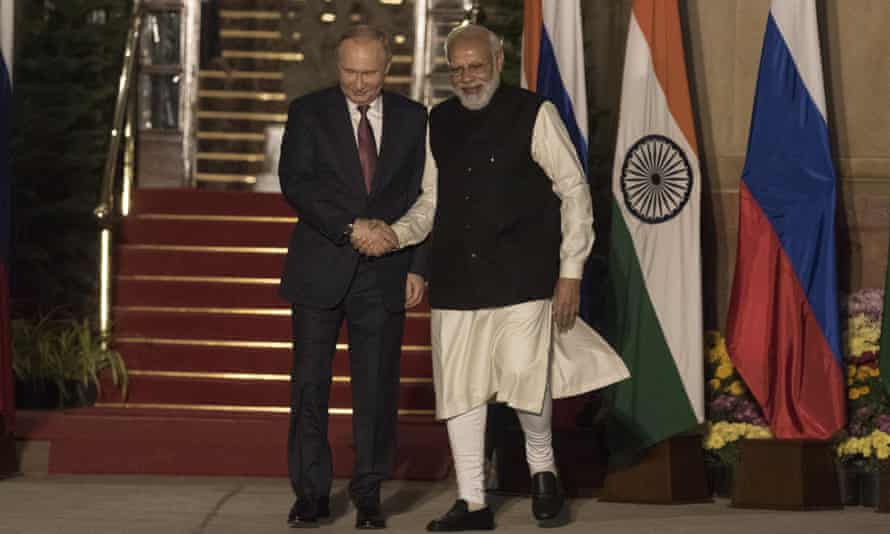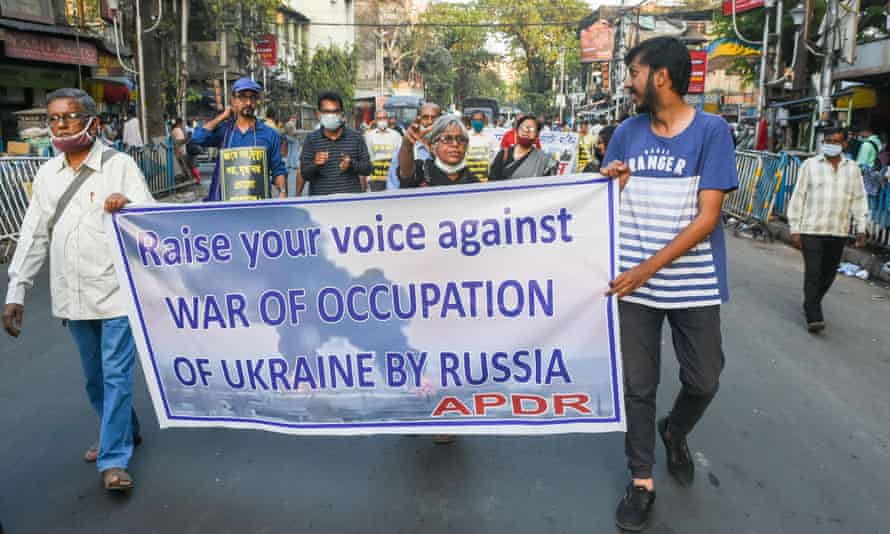As the Indian prime minister, Narendra Modi, picked up the phone to Vladimir Putin this week – the latest in several phone calls between the two leaders since Russia invaded Ukraine – he put forward a suggestion.
Modi’s push, according to an Indian government statement, was that Putin should have a “direct conversation” with the Ukrainian prime minister, Volodymyr Zelenskiy, in order to “greatly assist ongoing peace efforts”.
It was the latest signal from India that while it has refused publicly to condemn Russia’s violent and merciless actions in Ukraine, it might not approve of them.
Since Putin embarked on his invasion of Ukraine, much criticism has been directed at India for its refusal to openly repudiate Russia.
India has abstained in multiple UN security council votes against Russia’s actions, isolating it from the west, and in statements it has made vague references to the need for dialogue, diplomacy and respect for territorial integrity, without ever naming Russia directly.
To many, this is tacit approval for Putin from a country that has been an unwavering ally since before the cold war.
But for those familiar with India’s diplomatic history and traditions, the picture is far less black and white.
“India has never named names, as far as its allies are concerned,” said Avinash Paliwal, the deputy director of Soas’s South Asia Institute. “But India’s displeasure with Moscow is visible in how they are dealing with the Ukrainians, visible in the statements it is making at the UN, and visible in their repeated calls for a de-escalation of violence.”

Putin’s invasion of Ukraine has certainly put India – which considers both Russia and the US to be close and vital allies – in a difficult position, evident in the cautious diplomatic tightrope it has been walking the past few weeks.
There is, as Paliwal described it, a “historical hangover” in favour of Russia in India which dates back to the USSR and its support for India in the bloody Bangladesh war in 1971.
The Indo-Russian relationship has continued to be nurtured by successive prime ministers (Modi and Putin met as recently as December) and, most crucially for India, Russia is its biggest supplier of weapons, with between 60% and 80% of India’s weapons and defence systems bought from Russia.
With India engaged in an ongoing tense military standoff with China along its Himalayan border, where a buildup of troops and weapons continues on both sides, and its relationship with its nuclear-armed neighbour and rival Pakistan remaining testy, India finds itself in no position to jeopardise the flow of defence equipment from Russia.
Within India, where sympathy for Russia is still prevalent both in the policymaking corridors of New Delhi and in the wider public consciousness, there is also little pressure for Modi to denounce Russia’s actions.
As the conflict broke out, #IStandWithPutin gained significant traction on Indian social media.
Yet India has far from publicly taken Russia’s side and, as Syed Akbaruddin, India’s former permanent representative to the UN, pointed out, in its own subtle way, India’s statements around the invasion of Ukraine have increasingly diverged from Russia’s.
“Yes, India is abstaining when most of the world is voting against Russians, but in our mind, abstention is absolutely not support,” said Akbaruddin. “This whole action has left us in a space, not of our liking, not of our wanting, so why would we support it.”
Akbaruddin said there were “at least four or five” moments in recent weeks where India had increasingly distanced itself from the Russian position, including when they expressed “regret at the outbreak of hostilities”.
“Without mentioning Russia’s name, this is our way of condemning the actions of those responsible for the violence,” Akbaruddin said.
He also said India had, in an unusual move, outright denied statements made by Putin that Ukrainians had taken Indian students hostage, while also sending several planes of humanitarian assistance to Ukraine.
This week Modi made phone calls to both Putin and Zelenskiy, and made repeated calls for a diplomatic solution, though India has not yet positioned itself as a mediator in the same vein as Israel or Turkey.

India’s other priority, pulling it in the opposite direction, is to protect its flourishing relationships with the US, Europe and the UK.
India’s non-defence trade with Russia is only $9bn (£6.8bn), compared with about $100bn with the US, and it has ongoing trade deal negotiations with the UK. Unlike China, Russia’s other significant ally, India has remained silent on the issue of Nato’s expansion.
Tanvi Madan, director of the India project at the Brookings Institution in Washington, said that while India’s position on Russia’s invasion had thrown some “turbulence” into the US-India relationship, the White House has been understanding of India’s historical relationship with Russia and its security vulnerabilities vis-a-vis China, and so it was unlikely to disrupt diplomatic ties.
Most worrying for India, said Madan, was the increasing closeness between Russia and its foe China, which could have an impact on the choices Moscow makes when its China and India security partnerships are in tension
“The true ramifications for India are still being figured out,” said Madan. “But it’s likely there could be some tough decisions ahead.”


